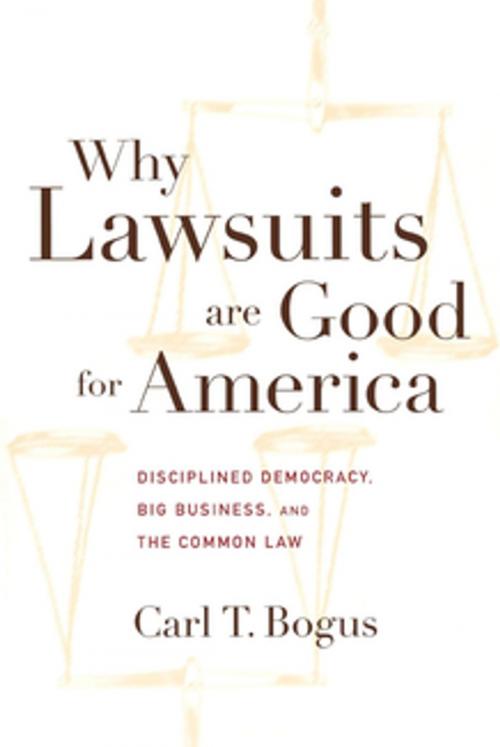Why Lawsuits are Good for America
Disciplined Democracy, Big Business, and the Common Law
Nonfiction, Reference & Language, Law| Author: | Carl T. Bogus | ISBN: | 9780814737941 |
| Publisher: | NYU Press | Publication: | July 1, 2003 |
| Imprint: | NYU Press | Language: | English |
| Author: | Carl T. Bogus |
| ISBN: | 9780814737941 |
| Publisher: | NYU Press |
| Publication: | July 1, 2003 |
| Imprint: | NYU Press |
| Language: | English |
Judging by the frequency with which it makes an appearance in television news shows and late night stand up routines, the frivolous lawsuit has become part and parcel of our national culture. A woman sues McDonald’s because she was scalded when she spilled her coffee. Thousands file lawsuits claiming they were injured by Agent Orange, silicone breast implants, or Bendectin although scientists report these substances do not cause the diseases in question. The United States, conventional wisdom has it, is a hyperlitigious society, propelled by avaricious lawyers, harebrained judges, and runaway juries. Lawsuits waste money and time and, moreover, many are simply groundless.
Carl T. Bogus is not so sure. In Why Lawsuits Are Good for America, Bogus argues that common law works far better than commonly understood. Indeed, Bogus contends that while the system can and occasionally does produce “wrong” results, it is very difficult for it to make flatly irrational decisions. Blending history, theory, empirical data, and colorful case studies, Bogus explains why the common law, rather than being outdated, may be more necessary than ever.
As Bogus sees it, the common law is an essential adjunct to governmental regulation—essential, in part, because it is not as easily manipulated by big business. Meanwhile, big business has launched an all out war on the common law. “Tort reform”—measures designed to make more difficult for individuals to sue corporations—one of the ten proposals in the Republican Contract With America, and George W. Bush’s first major initiative as Governor of Texas. And much of what we have come to believe about the system comes from a coordinated propaganda effort by big business and its allies.
Bogus makes a compelling case for the necessity of safeguarding the system from current assaults. Why Lawsuits Are Good for America provides broad historical overviews of the development of American common law, torts, products liability, as well as fresh and provocative arguments about the role of the system of “disciplined democracy” in the twenty-first century.
Judging by the frequency with which it makes an appearance in television news shows and late night stand up routines, the frivolous lawsuit has become part and parcel of our national culture. A woman sues McDonald’s because she was scalded when she spilled her coffee. Thousands file lawsuits claiming they were injured by Agent Orange, silicone breast implants, or Bendectin although scientists report these substances do not cause the diseases in question. The United States, conventional wisdom has it, is a hyperlitigious society, propelled by avaricious lawyers, harebrained judges, and runaway juries. Lawsuits waste money and time and, moreover, many are simply groundless.
Carl T. Bogus is not so sure. In Why Lawsuits Are Good for America, Bogus argues that common law works far better than commonly understood. Indeed, Bogus contends that while the system can and occasionally does produce “wrong” results, it is very difficult for it to make flatly irrational decisions. Blending history, theory, empirical data, and colorful case studies, Bogus explains why the common law, rather than being outdated, may be more necessary than ever.
As Bogus sees it, the common law is an essential adjunct to governmental regulation—essential, in part, because it is not as easily manipulated by big business. Meanwhile, big business has launched an all out war on the common law. “Tort reform”—measures designed to make more difficult for individuals to sue corporations—one of the ten proposals in the Republican Contract With America, and George W. Bush’s first major initiative as Governor of Texas. And much of what we have come to believe about the system comes from a coordinated propaganda effort by big business and its allies.
Bogus makes a compelling case for the necessity of safeguarding the system from current assaults. Why Lawsuits Are Good for America provides broad historical overviews of the development of American common law, torts, products liability, as well as fresh and provocative arguments about the role of the system of “disciplined democracy” in the twenty-first century.















